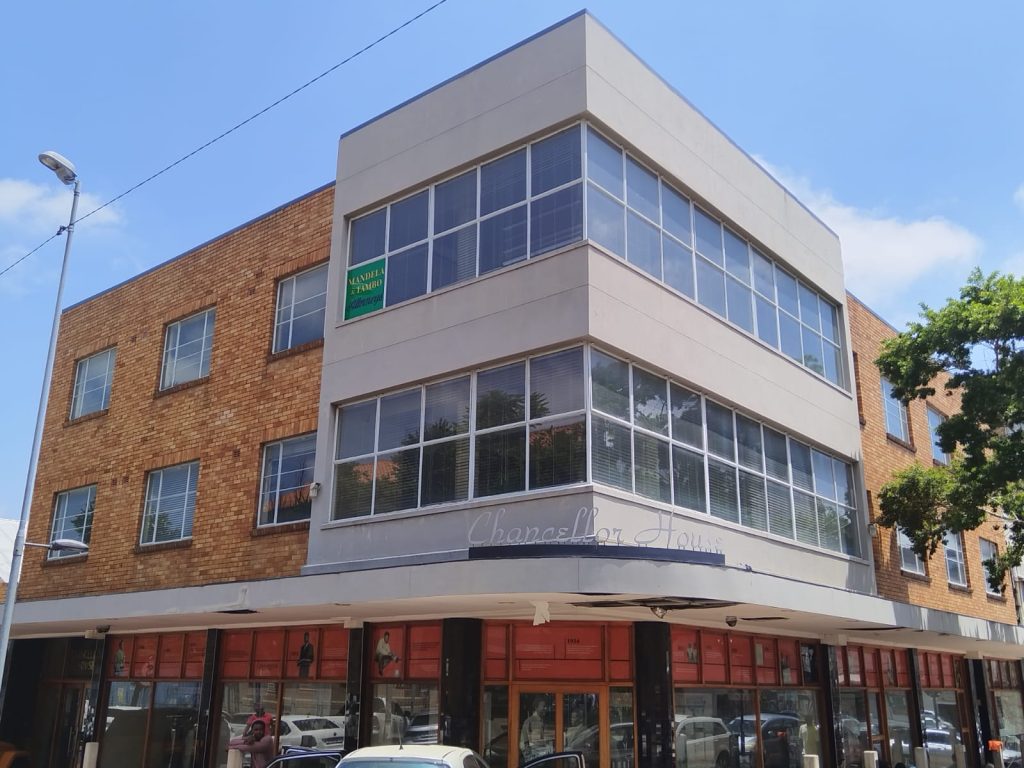Eyethu Cinema opened on the 30th of August 1969 in Mofolo, Soweto. It was a striking, modern building with two levels and space for 1,400 people. At a time when most cinemas were only for white people, “Eyethu” which means “ours” in isiZulu – was built for the Black community.
It was started by Ephraim Batana Tshabalala and wife, Caroline Kinini Tshabalala, who used money saved from their successful local fuel garage business to build a space where people in Soweto could watch movies, enjoy live shows, and come together as a community.
Eyethu was more than just a cinema. It hosted live music, community events, and charity work. It became a proud symbol of ownership, joy, and unity during the difficult years of apartheid.
After its closure in the 1990s, the building gradually fell into disrepair, but its legacy endured in collective memory. In 2025, the site was revived and reimagined as the Eyethu Heritage Hall, a heritage space where the community can once again gather, celebrate culture, and share stories within the Eyethu Shopping Centre precinct.
Eyethu Cinema, once a thriving cultural hub in Mofolo, Soweto, holds a significant place in the social and architectural history of South Africa. Established in 1969 by husband and wife, Ephraim Batana Tshabalala and Caroline Kinini Tshabalala, the cinema was not just a building. It was a bold declaration of ownership, pride, and cultural independence during the oppressive era of apartheid.
Built as a two-tier, modernist venue with over 1,400 seats, Eyethu Cinema was one of the first Black-owned cinemas in South Africa. At a time when apartheid laws barred Black South Africans from accessing most cinemas and entertainment venues, Eyethu became a vital space where the community could come together to experience film, storytelling, and artistic expression on their own terms. Fittingly, the name Eyethu, meaning “ours” in isiZulu, captured the essence of what the cinema stood for: a place for the people, by the people.
The Tshabalalas were respected entrepreneurs and community leaders who had built successful businesses in Soweto since the 1940s, including one of the township's top-performing Shell garages. Using savings from their businesses and tax rebates, they created Eyethu Cinema not just as an entertainment venue, but as a cultural and moral institution for Soweto.
The cinema offered five scheduled movie slots per day, each intentionally curated: Kiddies’ Club (Mornings): It was a standard to welcome children popcorn and ice cream. Then during school holidays, the Tshabalalas went further by hiring a circuses and merry-go-rounds for the parking lot, creating a full day of fun and safety for young people.
Afternoon Action Films: Featuring martial arts and culturally inspired fight films that promoted discipline, bravery, and ethics. These were family-friendly and designed to uplift and inspire.
Evening Features: Mainstream or local films that appealed to broad audiences. Midnight Specials (a weekend exclusive): A wildly popular adult slot from midnight to 2:00 AM, often drawing full houses and becoming a social ritual for many Sowetans.
Intermissions as Celebration: Even the film breaks were communal. Eyethu famously played Michael Jackson’s “Thriller” during intervals, often turning the cinema into an impromptu dance floor.
The Tshabalalas believed cinema could shape moral values, so movies were selected to model pride, good behaviour, and ambition. Certain films such as Joe Bullet (with an all-Black hero cast) and Shaka Zulu were banned by authorities due to their empowering messages. After Shaka Zulu aired, youth began crafting spears and imagining new ways to resist apartheid rule, proving the power of Eyethu’s screen as a tool for awakening.
Eyethu quickly became more than a movie house. It was a community nucleus, a venue for live music (local and international), social gatherings, community charity, and cultural events. For many in Soweto, it was where they saw their first film, had their first date, or danced with friends. It offered dignity, delight, and belonging during years marked by state violence and racial oppression.
In the 1990s, as apartheid ended and media habits shifted, the cinema industry saw a dramatic decline. The rise of television, VHS, and DVDs led to reduced foot traffic. Greater mobility meant Sowetans could now access newer entertainment options in other areas - Eyethu struggled to remain open.
Even as it decayed, Eyethu was not forgotten. Local artists used the building’s walls for graffiti murals and photography. In time, the community and the Tshabalala family came together to preserve the spirit of the space.
In 2025, the site was transformed into the Eyethu Heritage Hall, part of the Eyethu Shopping Centre precinct. The Hall now serves as a space for storytelling, visual art exhibitions, youth entrepreneurship, and heritage and film focused programming.
Eyethu remains a symbol of resistance, pride, and cultural creativity. It is remembered not just for the films it screened, but for the joy it spread, the values it upheld, and the pride it instilled. Today, the Eyethu Heritage Hall continues that mission: offering a space for collective memory and future-facing expression.

A culmination of research gathered over many years, the Online Johannesburg Heritage Register is being launched on Nelson Mandela Day 18 July 2025.
Among the many heritage sites featured is Chancellor House, the downtown offices of Mandela and Tambo Attorneys in the 1950s. After having been vacant and shuttered for more than a decade, this iconic building is being revived and brought to life once again as offices for the Community Development Department, which oversees the City’s Arts, Culture & Heritage Services.